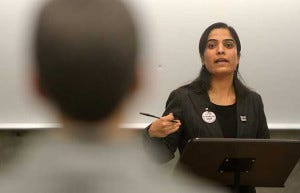Stresses that U.S. should be held liable for overseas involvement
The Aug. 9, 2010, cover of TIME magazine asked “What happens if we leave Afghanistan?” showing a photograph of a disfigured Afghani woman, a victim of war violence.

But Afghani women’s rights activist Malalai Joya wants to know — What happens because we are in Afghanistan?
Joya spoke Thursday, Oct. 17 at Berkeley City College to more than 300 students and community members.
Her presentation was part of a 60-meeting tour, encompassing talks from coast to coast.
The tour was coordinated by the United National Antiwar Coalition (UNAC), a national coalitional of organizations that aims to gain democratic decision-making for war-torn nations such as Syria and Afghanistan, and for the U.S. to cease waging war in such countries.
Joya, a former Parliamentarian in the National Assembly of Afghanistan from 2005 until early 2007 when she was expelled from the country for denouncing the government for its involvement with war criminals, is an adamant supporter of women’s rights.
Her talk was centered on the human rights violations taking place in her country and the crimes the United States is perpetrating.
The question of “What happens because we (America) are in Afghanistan?” has a complex answer, according to Joya.
The U.S has interests in Afghanistan, such as the illegal trade of opium; since 2001 the illegal production of opium has increased 4400 percent, Joya cited.
This sets off an array of problems. Women and children become addicted. Crime rises to startling rates. Domestic violence is at an all time high.
According to Joya, 80 percent of women suffer from some form of domestic violence, while others suffer sexual assault. Women are simply not a priority.
But the U.S. entered Afghanistan under the ruse of protecting women as their priority. “Women’s rights were a good reason to come in to Afghanistan, but coming in brought the warlords to power, and it made things worse,” Joya said.
She speaks of the dominance of warlords and war criminals in places of power.
These warlords commit heinous crimes and the lives of civilians are at stake as 20 million out of a population of 27 million people living in Afghanistan live below the poverty line. “This is a war on innocent civilians, not a war on terror,” Joya said.
Joya is adamant that things must change. “As long as there is a U.S. presence, there will be no independence,” she said.
However, Joya has seen evidence of change. Groups such as the Solidarity party, comprised of optimistic youth who are aiming to revolutionize politics, are just one example of those hoping to change the country.
When asked how youth can follow in her footsteps, Joya said, “Liberation should be achieved by the people themselves.”
She went on to say, “Brave protesters must be aware of our history,” speaking of the history of revolutionaries who have succeeded. Joya also made it clear that a strong education is vital to the success of her nation.
Event sponsor and Berkeley City College Global Studies Program Coordinator Joan Berezin has heard about Joya for many years and agrees with the notion of taking a stand for liberty.
“Voices like Malalai’s can be a catalyst for others to feel that it is possible and necessary to take a stand for what you believe in and to act to bring about social change,” Berezin said.
BCC student Bridget Lawhon also enjoyed Joya’s presentation and her push for social change. “Malalai is dedicated to creating national unity for the Afghani people. She is a true freedom fighter and an inspiration,” Lawhon said.
Many were indeed inspired by Joya’s call to action and her revelation of the United States’ human rights violations in Afghanistan.
Joya encouraged many to take a closer look at our government and even a closer look at themselves. One of the most important things Malalai Joya wants is peace for the people of Afghanistan, but until the U.S. pulls out of the country, warlords are brought to justice, and the rights of women are revolutionized, peace is a long time coming. As Joya said “peace without independence and justice, is meaningless.”

























